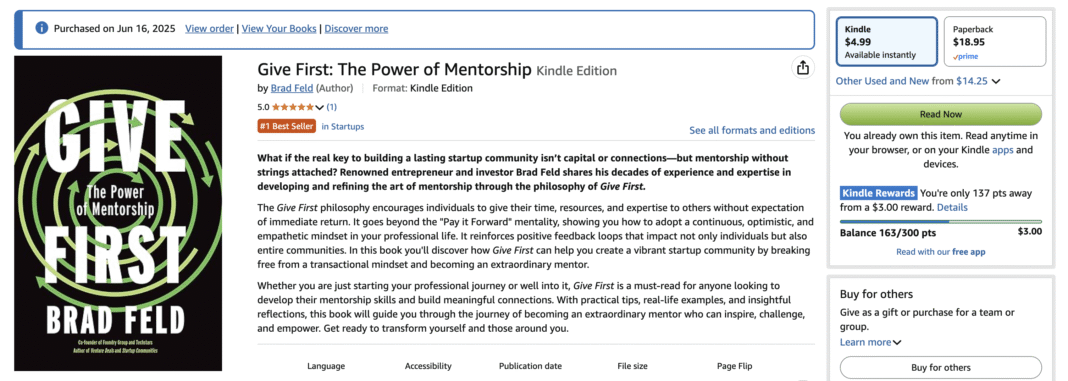I haven’t read much in the last 30 days as I’ve been consumed with writing, speaking, and events around the launch of Give First: The Power of Mentorship. The Kindle version is now available, and the paperback version will be released on Tuesday, June 24, so I’m in the home stretch of pre-launch. It hit #1 in Startups yesterday, so if you are inclined to buy, now is the time to keep the momentum going!
Amy and I are in Aspen, so I’m having a lot less social in the evenings. That means – reading on the couch after dinner.
I finished two books last night. The first was Barry Eisler’s new novel The System: A Novel of the Deep State. I love Barry’s writing and read every book he writes. He has total mastery of the contemporary thriller with extraordinarily vibrant characters and a zillion endnotes that tie to things that are actually happening in the real world. The protagonist, Valeria Velez, is fantastic, and I hope she shows up in a few more books. And, John Rain needs to show up in the Valeria Velez series. If you like mental floss, Brad-the-book-salesman says make today a two-fer and buy The System: A Novel of the Deep State and Give First: The Power of Mentorship.
I try to only read mental floss every third book, so last night I got to work on consuming Little Black Classics Box Set (Penguin Little Black Classics). It’s my summer reading project, which is a curated library of eighty pocket-sized books that encapsulate the breadth and diversity of literary history. This collection spans continents and centuries.
For example, here are a few summarized by my favorite AI: the searing social commentary of Jonathan Swift’s A Modest Proposal; the timeless Greek tragedy of Sophocles’ Antigone; haunting tales of the macabre in Edgar Allan Poe’s The Tell-Tale Heart; the revolutionary political theory of Karl Marx and Friedrich Engels’ The Communist Manifesto; profound reflections on life from ancient Japan in Kenkō’s A Cup of Sake Beneath the Cherry Trees; the witty and satirical juvenilia of Jane Austen’s The Beautifull Cassandra; psychological depth in Fyodor Dostoevsky’s short story The Meek One; the lyrical beauty of John Keats’ narrative poem The Eve of St Agnes; early feminist arguments in Mary Wollstonecraft’s A Vindication of the Rights of Woman; and the sharp, observational fiction of Anton Chekhov’s Gooseberries.
I read the first one in the series last night: Mrs Rosie and the Priest by Giovanni Boccaccio. I’ve never read anything by Boccaccio and didn’t know that 14th-century Italians were so filthy and degenerate (well, yes, I did, nothing ever changes, we are humans after all.) The commentary on gender, female agency, and society is sharp. I liked all the female protagonists, but Bartolomea was my favorite. The dialogue, even translated into English, is fun and spicy.
As I continue to see how good (or bad) different AIs are, I asked Gemini, “What lesson am I supposed to learn from the book.” After it gave me three tedious and overwrote paragraphs, I asked, “Give this to me in one paragraph. Use Brad Feld’s style of writing from feld.com”
“I love when a piece of writing from the 1300s delivers a mental model that feels like it was written for a startup founder in 2025. Boccaccio’s story about Mrs. Rosie is a masterclass in hacking a legacy system. You have a protagonist facing a fatal outcome from a set of rules—a legal and religious OS—that is fundamentally asymmetric and designed to benefit the people in power. Instead of accepting the premise of the game, she calls bullshit on the entire system with an argument so logical and witty that it forces the system to self-correct. She doesn’t fight the power structure with force; she uses intellectual arbitrage to expose its hypocrisy and bankruptcy. It’s a powerful reminder that challenging the core assumptions of a broken system is often infinitely more effective than trying to win within its stupid, arbitrary constraints.“
Eh – not so good. And the description is only about one of four stories.
